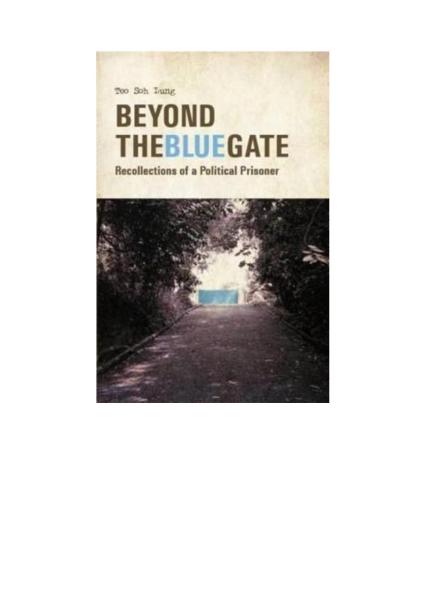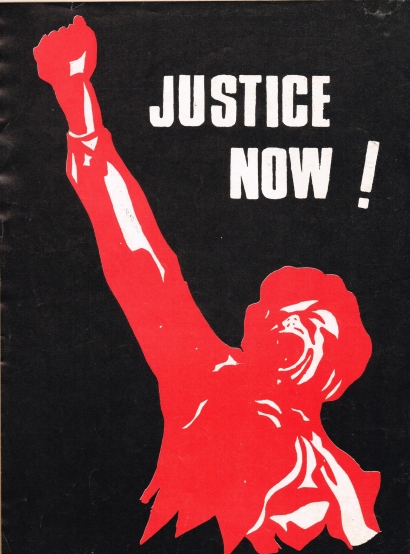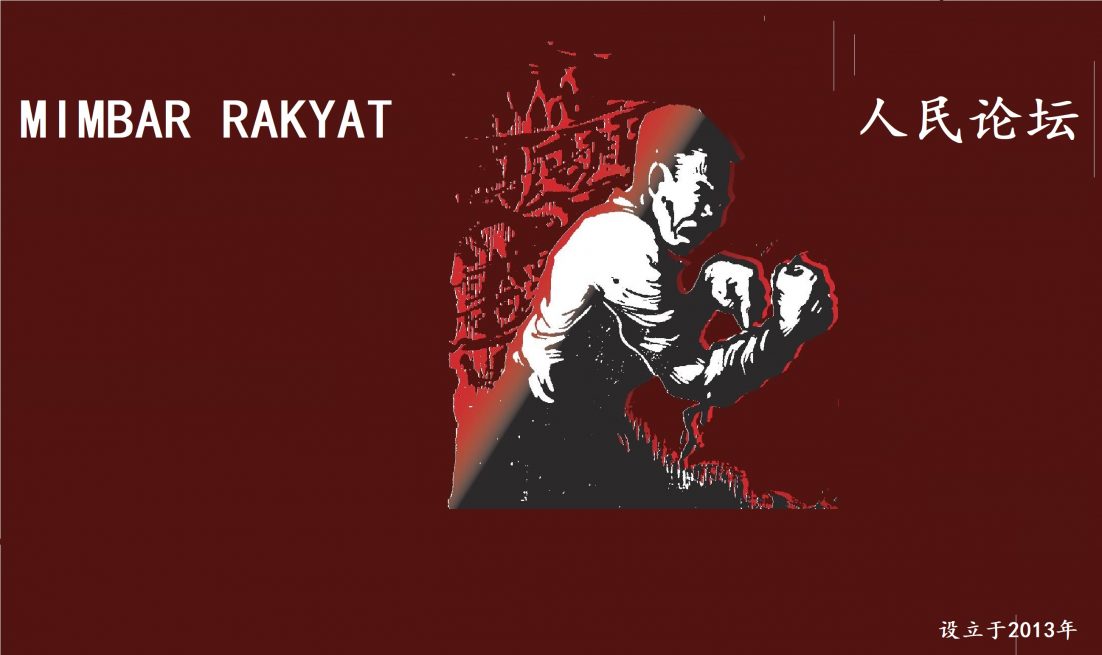By Teo Soh Lung 张素兰

四天前,我和曾志成(Kenneth Tsang Chi Seng)与香港的《苹果日报》记者问见面。记者问道我们是否准备去吊唁李光耀。肯尼.惹耶惹南回答说。他将不会去。当记者追问什么原因时,他嘀咕的说了好像是没有必要的意思。
这位年轻的记者接着追问为什么?接着他们转来问我。我也一样回答说,我不会去。他们还是继续追问这个问题。我给他们一个很勉强的理由,那就是排队吊唁的人龙太长了。我对自己这样的回答感到惊愕。
过去一个星期的“全国哀悼”。我的邻居问我,谁是李光耀的狂热的粉丝?我会要去吊唁吗?我简单的回答说:“不”。我没有进一步的说明为什么。他们也不再追问了。假设现在要我说明这个问题,我想,这是我对死者尊重的方式。我不要伤害向我提问的人。因为这个死者在他担任总理期间是伤害到我和我的家人及朋友。
在吊唁期间,群组的人在聊天时就谈起了在烈日下排队的人龙、吊唁的策划和葬礼的安排,包括了公交车及地铁的延长川行服务时间、以及不可思议的死者所取得的成就等。在第六天,我不再忍受这样的讯息,我离开了群组。我并没有告诉他们什么原因。当然或许就是对死者的尊敬的问题。
那些了解我的朋友问我是否需要撰写一些有关李光耀的文章。我在20多天前是有想过这么着的。但是我的脑袋一片空白。我无法找到感觉。那是由于我的内心告诉我要继续保持沉默,不要干扰目前全国的悲痛。让这些人在平和中发泄悲痛。在李光耀逝世后的隔天,我只是在3月24日写了一段有关自己的妈妈的短文。我并没有刻意的去写这篇短文的。但是,它确实自然的产生。这大概是我的妈妈唆使我去写这篇短文吧。我到妈妈的坟前吊唁。这是妈妈逝世三周年了。突然间,我的妹妹开始谈起妈妈的过去。她回忆起与妈妈唠叨的往事。她所说的事我知道得不多,以及妈妈对我的被捕的感受。她憎恨这个死者以及她拒绝观看这个死者在电视机荧幕上出现的镜头。在回家的路上。我从她的想法里找到了灵感。我是不会理会李光耀的。比起死者和全国的吊唁,我的妈妈更加悲痛。在我撰写完这篇短文并把它上载到脸书(FACEBOOL)时我哭了。这个时候是她三年前逝世的日子。
好了,让重新回到记者的问题。我思考了几个小时。我为什么不可以给她一个真实和直接的答案呢?为什么我不可以说我不去参与吊唁是因为李光耀不经审讯把我关在监牢2年半呢?这样理由不是更好吗?当我回想起来,我越觉得自己是愚蠢的。这是某些下意识造成了我避免给予记者真实的答案。我对自己感到生气。这确实是荒唐的。
在思考了几个小时后,我终于醒悟过来了!——真正的原因是:因为恐惧感造成的!
——我恐惧,人们在进行沉痛吊唁和极端悲伤的这段时间谈起我的这段遭遇会让人们有不好的想法。
——我恐惧,他们会达到的结论是我由于个人的遭遇感到生气和痛苦。正如大主教所说的,成了一个不肯原谅他人继续往前看的人。
这就像是一个被人强奸的受害者的感受。他们的反应是拒绝向警方举报。因为他们害怕调查官不会相信他的说法,或者反指受害者自己的穿着或者行为不捡所致的。他们害怕自己的名义和个人安全将会因为举报而受到侵害。社会上的人们将会怎样看待她们?社会上的人们将会有什么反应?这是确实非常复杂的、危险和让人惊吓的。因此最好的方法就是保持沉默,忘记那些肮脏的事件和‘继续前进’。让强奸者逃避应受到的惩罚和继续犯下更多的罪行。让更多的妇女遭受痛苦。
在认识到让我不想向记者说出真正的原因是因为恐惧感造成的后,我终于解脱了。这正如一个超重的包袱从我的身上卸了下来一样。我立即解决了另一个问我要不要去国会大厦吊唁的人提出的问题了。我直接告诉他, 我不会去向一个不经审讯把自己的公民关进监牢,造成了这么多痛苦的人、他们的家人和朋友致敬!
就在那天傍晚,一个在排队对轮候了数个小时在黎明后才得以进去吊唁的人问我是否会去吊唁时,我的回答是:‘不会。他曾经对我做了什么?他把我关进监了2年半。您说,我还会去向他致敬吗?’在我向他说出了这段经历后,他惊讶的问我为什么被关进监牢里?我告诉了他有关内部安全法令的问题。假设他要知道我的遭遇,我请他到谷歌搜索我名字。他说,他并不知道那个伟人的另一面。事实上,他并不知道这一切,同时我给他的答案可能让他感到惊讶。那天傍晚,他向其他2位朋友询问是否知道我的被捕情况。其中一位说他知道。另一位推说她不知道。
在1987年和1988年,李光耀和他的部长们在内部安全法令下,不经审讯的逮捕和监禁了24人。他们的名字如下:
1 Vincent Cheng Kim Chuan, Church worker
钟金全–教会工作者
2 Teo Soh Lung, Lawyer
张素兰–律师
3 Kevin de Souza, Lawyer and Church worker
凯尔文.德苏沙工艺学院学生会
4 Wong Souk Yee, Researcher and journalist
黄淑仪–高级研究员
5 Tang Lay Lee, Lawyer and Church worker
董丽莉–律师
6 Ng Bee Leng, Church worker
黄美玲–社会志工
7 Jenny Chin Lai Ching, Journalist
陈丽清–新闻工作者
8 Kenneth Tsang Chi Seng, Advertising executive
曾志成–广告执行员
9 Chung Lai Mei
钟丽薇–工人
10 Mah Lee Lin, Polytechnic graduate and Church worker
马丽玲–工艺学院学生
11 Low Yit Leng, Project manager
刘月玲–规划经理
12 Tan Tee Seng, Sales executive
陈智成–销售执行员
13 Teresa Lim Li Kok, Publisher
林丽国–出版商
14 Chia Boon Tai, Engineer and businessman
谢文泰–商人
15 Tay Hong Seng, Translator and subtitling editor
郑方升–编辑
16 William Yap Hon Ngian, Translator and subtitling editor
叶汉源–副编辑
17 Tang Fong Har, Lawyer
陈凤霞–律师
18 Chew Kheng Chuan, Harvard University graduate and Businessman
周庆全–商人
19 Chng Suan Tze, Polytechnic Lecturer
庄碹芝–工艺学院讲师
20 Ronnie Ng Soon Hiang, Polytechnic student
黄顺贤–工艺学院学生会秘书
21 Fan Wan Peng, Polytechnic student and president of the students’ union
范运冰–工艺学院学生会会长
22 Nur Effendi Sahid, National serviceman
诺挨芬德–国民服役人员
在1988年在上述被逮捕的拘留者中的8位因为发表了联合声明后与他们的律师一起重新被逮捕的还包括前总检察长和新加坡律师公会主席萧天寿(Seow Tiang Siew)和律师以及新加坡律师公会执委常国基(Patrick Seong Kwok Kei)。在2年内,2位在欧洲的朋友的新加坡公民权被遞夺了。他们是英国牛津大学毕业生的陈华标(Tan Wah Piow)和在比利时的博士生Paul Lim Huat Chye。
他们与陈凤霞(Tang Fong Har)都成了政治流亡者了。Tang Fong Har是8位给他发表联合声明的签署人之一,但是,她成功的逃脱了被重新逮捕的命运。她最终流亡到伦敦。在接下来的几年,Francis Seow(萧天寿)也成为了政治流亡者。萧天寿是在几乎赢得1988年大选的席位下被追捕的。他是一个政治被迫害者。
当李光耀在弥留前的最后几天他的孩子和孙子可以陪伴在他的身边时,那些政治流亡者,包括了那些在60年代和70年代却不准与自己的至亲见面会和无法出席在新加坡逝世的自己双亲和伴侣的葬礼。
我们经常都会听到一些人说,他们的逮捕行动是为了国家的利益。这事实就是要牺牲一部分自己的公民。我无法理解这样的声明。假设他们和他们的至亲在不经审讯下被逮捕并监禁起来,他们是否也持有相同的看法?
李光耀是一个狡猾的政客。他知道哪些他需要逮捕的人的本性和性格。他知道林清祥是能干的人,是一个比他还要能干可以担任总理职位的人。他知道林福寿医生和傅树介医生的智慧与他的智慧是一样,但是不比他还高。他知道赛.查哈利老先生在马来人社群里具有崇高的地位。赛老可以与他挑战管理新加坡。假设这些人都能够允许参与1963年的大选的话,他们将会中选。为此,他们在冷藏行动下被逮捕并被监禁超过数十年。这些人当时如果能够中选进入国会将会为我们的国家取得比现在更高的成就。他们将会为我们的国家的政治和法律事项,在国会里与那个人以及他的那群温顺的内阁进行辩论。
那个“两个就够”的家庭计划和限制新加坡公民与外国人结婚的政策可能就不会被通过实施了。新加坡也就不需要为人口增长率的下降和劳动力短缺而烦恼。语言和方言将会更加活跃,将让新加坡成为一个更加具有特性性的文化和多元种族具有刺激性的社会!滨海湾的赌场就不会成为推动新加坡经济的主要动力,新加坡的社会就不会成为一个赌徒的国家。
即便是在1987年和1988年的拘留者当中,有很多当时都是在社会的底层工作的。他们知道引进外来劳工的危险性。在促进我们国家的经济时将不会照顾到外来劳工的福利和为他们提供最低的生活工资收入。他们知道,政府采取引进外来劳工政策的结果是外来劳工最终将对我们的公民产生影响。这样对咱们国家有好处的劝告的人会被逮捕呢?假设当时政府是聆听这些拘留者的话并和他们一起改进有关的政策实施,今天新加坡可能会成为一个更好的国家。您可能会不同意,但是,请您不要告诉我说,逮捕这些一小部分国家未来潜在的人是为了国家的利益的。不要告诉我,当你不知道过去发生了什么?以及李光耀对我们的公民做了什么事又要我们继续前进!
恐惧已经死亡!
废除内部安全法令!

FEAR is DEAD
By Teo Soh Lung
Four days ago, and I were asked by journalists from Hong Kong (http://hk.apple.nextmedia.com/news/art/20150328/19093087) if we were going to pay our respect to Lee Kuan Yew. Kenneth replied that he would not. When pressed for an answer as to why, he muttered something like it was not necessary.
The young journalists were persistent in finding an answer and they turned to me. I too replied that I was not going. They pressed for an answer and I gave them the lame excuse that the queue was too long. I was dismayed at my own answer but didn’t know why.
For days during the week of “national mourning”, I have been asked by neighbours who were ardent fans of Lee Kuan Yew, if I was going to pay my respect. My answer was simply “no”. I did not elaborate and they never probe further. If I could interpret such an answer now, I think it was my way of respecting the dead, that I didn’t want to hurt the questioner that the dead had harmed me and my family and friends during his term of office as prime minister.
For days before the funeral, group chats had been flooded with reports of the long queue in the sun, the plans and funeral arrangements, the longer bus and train schedules, the unbelievable achievements of the dead and so on and so forth. On the sixth day, I could no longer tolerate such messages and left the groups. I did not give a reason, again perhaps out of respect for the dead.
Friends who knew my past had asked incessantly if I was going to write about Lee Kuan Yew. I did intend to write but for 20 days or more, my mind was a blank. I just could not put anything sensible on paper. It was as if an inner voice was telling me to remain silent and not disrupt the nation’s grief. Let them grieve in peace. I did however write a short piece about my mother’s thoughts on 24th March, a day after Lee died.I had no intention of doing so but the piece came naturally, as if my mother was instigating me to write for her. That morning, I had visited my mother’s niche, it being the third anniversary of her death. Suddenly, my sister started to talk about the past. She was having a conversation with my mother. I didn’t know much about what she went through and how she felt about my arrest, how she detested the dead and how she refused to watch the television whenever his image appeared. On the long journey home, I penned her thoughts. I didn’t care about Lee Kuan Yew. My mother’s grief was larger than that of the dead and the national mourning. I cried when I finished writing and posted it on my facebook. It was about the time of her death at home three years ago.
And so coming back to the journalists. I thought for many hours. Why was I not able to give an honest, direct answer? Why didn’t I say that I was not going because Lee Kuan Yew had imprisoned me up for two and a half years without trial and for no good reason? The more I pondered, the more ridiculous and stupid I felt. It was something in the sub conscience that prevented me from giving an honest answer. I was angry. It was truly absurd.
After thinking for a few hours, it suddenly dawned on me that the reason was Fear – fear that people will think badly of me especially at a time when they were in deep mourning and hysteria, fear that they would conclude that I was angry and bitter, unforgiving, a person who refused to “move on” as the archbishop said. It was like the reaction of rape victims. They decline to report the crime because they were afraid that the investigator would not believe them or even accuse them that they had asked for the rape to happen because of the way they behaved or dressed. They were afraid that their own reputation and safety would be damaged with the report. How would the public view them? What would their reaction be? It was all just too complex, risky and intimidating and it was best to remain silent, forget about the nasty incident and “move on”. Let the rapists escape punishment and commit more crimes. Let more women suffer.
Realising that fear was the reason which prevented me from giving an honest answer to the journalists, I suddenly felt liberated. It was as if a heavy load was lifted. I immediately resolved that the next person who asked me if I was going to Parliament House to pay my respect, I would let it be known that I do not respect a leader who imprisoned citizens without trial, who caused so much suffering to those imprisoned, their families and their friends.
That evening, someone who had just paid his respect to the dear leader after waiting for several hours before day break, asked if I was going. I replied: “No, after what he did to me, imprisoning me for two and a half years, how can I go and pay respect to him?” Taken aback, he asked why I was imprisoned. I told him about the ISA and asked him to google my name if he wanted to know more. He said he didn’t know the other side of the great leader. Indeed, he didn’t know and was probably shocked at my answer. He asked two friends that evening if they knew about my imprisonment. One said he did and the other pretended she didn’t know.
In 1987 and 1988, Lee Kuan Yew and his ministers arrested and imprisoned 24 people without trial under the ISA. They were:
1 Vincent Cheng Kim Chuan, Church worker
2 Teo Soh Lung, Lawyer
3 Kevin de Souza, Lawyer and Church worker
4 Wong Souk Yee, Researcher and journalist
5 Tang Lay Lee, Lawyer and Church worker
6 Ng Bee Leng, Church worker
7 Jenny Chin Lai Ching, Journalist
8 Kenneth Tsang Chi Seng, Advertising executive
9 Chung Lai Mei
10 Mah Lee Lin, Polytechnic graduate and Church worker
11 Low Yit Leng, Project manager
12 Tan Tee Seng, Sales executive
13 Teresa Lim Li Kok, Publisher
14 Chia Boon Tai, Engineer and businessman
15 Tay Hong Seng, Translator and subtitling editor
16 William Yap Hon Ngian, Translator and subtitling editor
17 Tang Fong Har, Lawyer
18 Chew Kheng Chuan, Harvard University graduate and Businessman
19 Chng Suan Tze, Polytechnic Lecturer
20 Ronnie Ng Soon Hiang, Polytechnic student
21 Fan Wan Peng, Polytechnic student and president of the students’ union
22 Nur Effendi Sahid, National serviceman
In 1988, eight of the above were rearrested after issuing a press release together with their lawyers, Francis Seow Tiang Siew, former Solicitor General and President of the Law Society of Singapore and Patrick Seong Kwok Kei, Lawyer and member of Council of the Law Society of Singapore. In the two years, two friends who were then in Europe had their Singapore citizenship revoked. They were Tan Wah Piow, an Oxford University undergraduate and Paul Lim Huat Chye, a PhD student in Belgium.
They became political exiles together with Tang Fong Har, a signatory to the press release but escaped rearrest as she was then in the United Kingdom. In subsequent years, Francis Seow too became a political exile after nearly winning the general election in 1988. It was political persecution.
While Lee Kuan Yew’s children and grandchildren were able to be by his side during the last days of his illness and funeral, the political exiles, including those who left Singapore in the 1960s and 70s were not able to see their loved ones or attend the funerals of their parents and spouse who died in Singapore.
It is common to hear people say that for the good of the nation, it is perfectly in order to sacrifice some of its citizens. I never understand such a statement. Would they have the same opinion if they and their loved ones were arrested and imprisoned without trial? Lee Kuan Yew as an astute politician knew the nature and character of who he demanded arrest. He knew Lim Chin Siong was as capable if not more capable than he as the prime minister. He knew that Dr Lim Hock Siew and Dr Poh Soo Kai were intellectually his equal if not superior to him. He knew that Pak Said Zahari commanded the respect of the Malay community and was capable of challenging his way of managing Singapore. If they had been permitted to contest in the 1963 general election instead of being arrested in Operation Coldstore and imprisoned for decades, their presence in the legislative assembly may have helped our nation to achieve even greater heights. There would have been genuine debates on policies and laws in parliament for the good of our country instead of bad policies and laws being rammed down our throats by one man and his docile cabinet.
The “Stop at two” and restrictive marriage policies of Singaporeans and foreigners may not have been implemented and Singapore would not need to fret about its dwindling population and labour shortage. Languages and dialects may have flourished, making Singapore a unique and exciting multicultural and multi racial society. Casinos may not be necessary to propel the economy resulting in Singapore becoming a nation of gamblers.
Even among the 1987 and 1988 detainees, many were working on the ground and knew the precarious nature of importing foreign labour to boost our economy while not looking after their well being and providing them with a minimum living wage. They knew that the way the government managed the foreign workers would ultimately have an adverse effect on our citizens. What good can such arrests bring to our nation? If the government had listened to the detainees and worked with them to improve policies, Singapore may be a better country today. You may disagree but please don’t tell me that arresting a small number of people who were or have the potential of being future leaders is for the good of our country. Don’t tell me to move on when you don’t even know what happened in the past and what Lee Kuan Yew had done to his own citizens.
Fear is dead.
Abolish ISA.



01/04/2015 13:46
看了张素兰的文章,能感受她妈妈的焦虑无助,不知女儿几时会被释放。
我同意文章的看法,因他耍做大,不能容天下的能人。若这些人一起共事,新加坡会变得更好。
在南洋大学关闭时是讲华语运动的开始。
讲华语运动开始,是方言被禁。新加坡华人完全和祖先断根了。
看全新加坡人一窝蜂去吊祭他崇韩他,可见多数人不知历史事实 ,一个使很多人的母亲因几子或女几没经省讯被关在牢狱里绞肠万断,不知几时会见面团圆。
我看大选会在他百日内举行,夹着全国悲痛情锗而胜出。你说呢?
黄先生,连反对党的两位资深议员刘呈强及詹时中都说他不霸道不独裁。你说是新加坡的反对党有问题? 还是你说错了?
赞赞
01/04/2015 23:39
身为反对党,他不可能直接公开的在国会说出自己的心里话,这可以理解的。毕竟他们的选区里还有中间的群众要争取。有些话只能由我们这些人说出来。
行动党是在自淫秽和淫想!
首先,参加葬礼的‘群众’是由他们的御用组织-居民委员会、全国职总、学校和那些在经济政策利益既得者所组织的;
第二,就如他们所说的,参加的人数约为整百万人,那就是他们在2011年大选的基本票。他们是在造声势。但是,在面对现实生活问题时,老百姓换上哟啊会带现实生活的。
赞赞
02/04/2015 10:25
非常敬佩劉程強先生,希望他當選新加坡總理。
赞赞
02/04/2015 12:56
他不会想着当总理。他只想在自己有生之年实现一个真正自由、民主化平等的新加坡
赞赞
02/04/2015 17:24
很感動, 曾經在電視上看到劉程強先生在國會裡的演講, 在一幫傲慢, 懶惰, 又貪得無厭的黑勢力中,他是唯一一個具有同情心的人,因此對他肅然起敬。
藉此,也向博主致敬,您犧牲了自己的時間,為推動新加坡早日實現向韓國,日本那樣的民主國家, 做出了巨大的貢獻。
赞赞
02/04/2015 17:39
很想與张素兰認識並做她的好朋友。
赞赞
02/04/2015 23:57
您可以直接到她的facebook与她交朋友
赞赞
03/04/2015 03:36
你说刘呈强是议员不便说真话。但詹时中巳不是,他去吊祭还去国葬礼,那怎么说?
请问在新加坡沦陷的三年八个月,他和纳丹在做什么?
为什么他们两人那么特别没被屠刹?
在英国殖民地时期,他在做什么?
现在很多人的华文低落只会讲不会写,华文师资缺乏,是他的策略吗?
赞赞
03/04/2015 06:17
詹时中正要向大家说明的,就是他就是一个信仰民主的人!
那丹是英国情报特务。李光耀是英国插进人民队伍的代理人。
赞赞
05/04/2015 01:00
黄先生,之前有在你的网页看过李光耀逃过大检证的原因。可否告诉网链以便再看过。
不好意思,想问什么叫英国插进人民队伍的代理人。
黄先生,你的网页有个红人高举拳头,进入您的网页一眼看到这个高举拳头的红人很不适。这是我个人的感觉。是不是这原因使人们不敢给评论。
赞赞
05/04/2015 05:37
1.所提的资料需要自找出来;
2.目前从大英博物馆所挖出来的官方资料已经足够证明了;
3.您说的插图是哪一张。
赞赞
05/04/2015 05:38
如果本文章中的这张插图,那是50年代的插图
赞赞